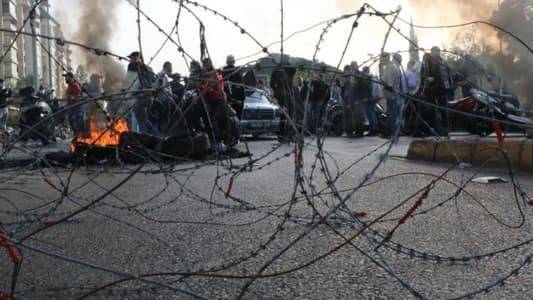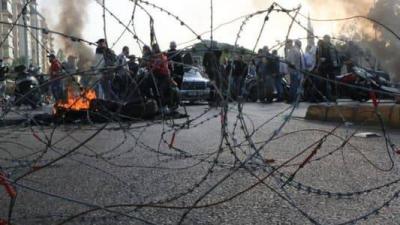There are many reasons that necessitate the unification of the Lebanese people under a common concern. This starts from the country's entry into a harsh phase aimed at accelerating starvation, to the resounding collapse of the judiciary, while also exposing the extent of external interventions and internal political exploitation of the victims of the port explosion, which will undermine the awaited truth. All of this has increased the rising tension on a stage that is open to chaos, which could potentially lead to a "sedition" that security agencies are treating as an "emergency risk," prompting them to elevate the state of readiness among their personnel. This coincided with the dollar surpassing the threshold of 57,000, imposing an even greater economic pressure and pushing the Lebanese into a more unstable phase regarding social security.
Indicators of accelerating decline began last week, prompting some activists from various regions to meet and discuss launching calls (which were supposed to be announced next week) for action in Riyad El Solh and Martyrs' Squares and in front of the Central Bank of Lebanon. However, the speed of the currency collapse and the fuel prices reaching astronomical figures outpaced any organized movement. As a result, some decided to express their anger by blocking several main roads well into the night. The blockades extended to local roads between villages, coinciding with dozens of protests in front of the Central Bank. Notably, there was a resurgence of faces around whom suspicions revolve, such as the well-known Tripoli activist Rabi Zein, who has been participating in every movement in front of the parliament over the past week in solidarity with the sit-in deputies, and yesterday in front of the Central Bank.
Judge Tarek Bitar's decisions, followed by an openly hostile response, have clearly divided the judiciary and will lead to another street movement pushed by the actions of the Public Prosecutor Ghassan Oueidat against the investigating judge "to protect Bitar," believing this ensures the emergence of the truth in the Beirut port explosion case. Sources informed "Al-Akhbar" that enthusiasm among activists to take to the streets is low, as if everyone is under the influence of recent bizarre developments. However, the swift release of detainees in the case has led some to propose ideas for movements and calls.
Based on the premise that "Oueidat wants to prevent Bitar from continuing the investigations," the families of the victims, accompanied by dozens of activists, carried out their first protest in front of Oueidat's house. They started distributing calls for a demonstration and escalation today at 11 AM in front of the Court of Justice, coinciding with a meeting of the Supreme Judicial Council to decide on Bitar's case, and other calls to gather at Bitar's home to protect him. All of them bore slogans such as "May 7th Judicial. With Judge Bitar. Our Bitar is back...". As usual, the Kataeb and Forces parties found a new opportunity for exploitation, as they will officially be present in the streets tomorrow. The principle of non-interference in the judiciary has fallen from the banner of the “Renewal” bloc deputies, the “Forces,” the “Kataeb,” and several “change-makers,” who will visit the Court of Justice today to meet with the President of the Supreme Judicial Council, Souheil Aboud, and the Minister of Justice, expressing their objection to "the violation of laws aimed at undermining Bitar and the investigations."
Security-wise, several prominent security references indicate that "the agencies are preparing to prevent any unrest. Their worries do not stem merely from an analysis of the overall scene, but rather from concrete data. They are in a state of monitoring and surveillance of activities in several regions." They add, "The emergency risk we consider is specifically the Christian-Shiite sedition and nothing else." One of the strongly possible scenarios involves "specific political assassinations targeting figures we currently consider within the danger zone, affecting the country's stability and potentially leading to events similar to the Tayouneh incident, but in a more violent and broader context."




